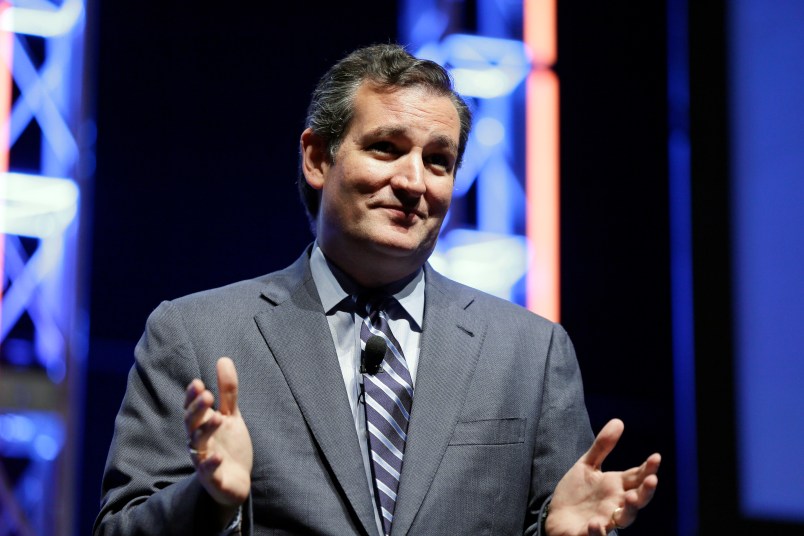A fascinating look at Arab-American political activism and its discontents as the background of the Cruz trainwreck. From TPM Reader HK …
Unfortunately, this is par for the course every time an Arab-American organizations tries to play “respectability politics” by courting the favor of politicians they know most of their constituents disagree with. It happens in both Muslim and Christian circles in the States.
Arab-Americans have few allies in Congress anymore. Those they did have (Cynthia McKinney and John Traficant, to name a few) we’re either too fringe or too corrupt to ever feel entirely comfortable with. David Bonior was districted out in Michigan and those members of Congress who represent areas with large Arab communities (Bill Pascrell, Marcy Kaptur, and John Dingell, to name a few) have increasingly over the years had to temper the decibel of their advocacy on any issue that runs afoul of AIPAC. Justin Amash might be it for now.
Arab-Americans, generally affluent and well-educated, but deeply opposed to most aspects of U.S. foreign policy in the Arab world and rightly skeptical of the surveillance state, do not have a natural home in either party. Similar to organized labor, the Democratic Party has proved a flawed and imperfect ally for enough of these issues, while those Arab-American Republicans (usually the most monied within the community) have often, and quite defensively, insisted that things would be a lot worse if they weren’t in the GOP, bravely daring to change the party from within, to spectacularly little result. I grew up in Illinois, and every time they got Ray LaHood in front of an Arab-American group, he wound up antagonizing everyone in the room.
But where things really get hairy and confusing are where issues of confessional identity come in to play.
The Bush Administration attempted, very feebly, to court Muslim American voters on the basis of social issues (short hand: Iraq War < Gay Marriage) and a few Muslim voters very willingly took the bait. In its pre-9/11 incarnation, the Council on American-Islamic Relations (CAIR) even tried positioning itself as a Culture War ally of the Evangelical Right (they once issued a press release denouncing the short-lived NBC animated series, “God, the Devil, and Bob” because it depicted Allah (swt) as a beer-swilling Jerry Garcia clone). Among Christians (a majority of Arab-Americans in the States), the breakdown is more stark. The past decade’s worth of violence in the region, and the vulnerability of religious minorities in Iraq and Egypt, have hardened the views of many (but not a majority )in the community and this cohort has become very, very vocal over the years. I’m still struck by the experience of attending a Coptic Church service in the Chicago suburbs a few years ago (in commemoration of the January 2011 Christmas Eve Church Bombing in Alexandria – what some consider one of the final inciting events of the 2011 Revolution), and the number of speakers who were thoroughly marinated in the language of Evangelical dispensationalism (a doctrine most Orthodox Christians don’t even accept). So much talk of the End Times, the anti-Christ, and what an evil, secular culture America is – as a secular, progressive, non-practicing Muslim, I apparently have a lot to apologize for. But from having a look around the room, I saw very few heads nodding in agreement; several looked incredibly peeved. The dynamic differs from culture to culture, for sure (solidarity among Palestinian Christians and Muslims should be the model for other Arab communities) but, even anywhere in that room, you would been very hard-pressed to find anyone who had any brief for U.S. policy towards Israel, no matter what they might otherwise think of Hamas, or the palpable threat to their own identities as Christians in their own homelands.
I have no doubt the leadership of IDC sees somebody like Ted Cruz as a natural ally on some issues, but these views are still very much in the minority view of Arab Americans. It’s just that they happen to be the ones with the most money. And they’re the ones who really ought to be embarrassed. I don’t blame Ted Cruz for being Ted Cruz (what would be the point of that, anyways?)






